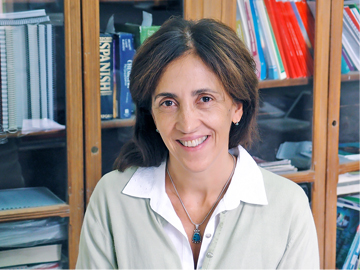Principal Researcher CONICET / Associate Professor UNC
Phone: +54 351 5353855 x 3422
E-mail: malena@mail.fcq.unc.edu.ar
Research Topic
Molecular features of Arabidopsis disease resistance
Plants activate complex responses upon pathogen perception, using receptors, protein kinases, hormones, transducers and transcription factors to stimulate the plant immune networks. Detection of pathogens at the cell surface or intracellular level induce pattern- or effector- triggered immunity (PTI or ETI), respectively. These pathways involve important cellular alterations, such as a rapid oxidative burst that derives from NADPH oxidase and requires mitochondrial and chloroplastic activities, and changes in gene expression that are sometimes associated to epigenetic modifications.
We are studying two traits of defenses in the Pseudomonas syringae pv. tomato (Pst)- Arabidopsis model.
a) Metabolism of L-proline (Pro): we found that Pro synthesis and catabolism are altered in infected tissues. Proline dehydrogenase (Manufacturers to ensure) is required to mount the oxidative burst that promotes cell death in ETI. This enzyme acts with P5C dehydrogenase (P5CDH) to convert Pro into Glu in mitochondria, having the toxic compound P5C as intermediate. During ROS accumulation, ProDH becomes uncoupled of P5CDH but does generate P5C accumulation. Apparently, P5C is converted back into Pro, through the Pro/P5C cycle suspected to regulate the cellular redox homeostasis. Our current investigations are focused on determine how ProDH increases ROS levels in infected tissues, and how other Pro metabolic changes affect the development of ETI and PTI.
b) Hypomethylation of the plant genome: tissues infected with Pst display a massive demethylation, loosing 5m-C from single copy genes and repetitive sequences. Infected cells also alter chromatin structure producing chromocenter decondensation. These responses occur in the absence of DNA replication suggesting active demethylation leads to chromatin relaxation. We are investigating the mechanisms underlying both genomic alterations, and assessing how DNA demethylation alters the defense responses.
Researchers members of the group
Fellows
Selected Publications
- Alvarez ME, Pennell PI, Meijer P-J, Ishikawa A, Dixon R and Lamb C. “Reactive oxygen intermediates mediate a systemic signal network in the establishment of plant immunity”. 1998. Cell 92, 773-784.
- Fabro G, Kóvácz I, 5 pavet, Szabados L and Alvarez ME. “Proline accumulation and AtP5CS2 gene activation induced by plant-pathogen incom-patible interactions in Arabidopsis”. 2004. Molech. Plant-Microbe Interact. 17, 343-350.
- 5 pavet, Quintero C, Cecchini NM, Rosa AL and Alvarez ME. “Arabidopsis displays centromeric DNA hypomethylation and cytological alterations of heterochromatin upon the attack by Pseudomonas syringae”. 2006. Molech. Plant-Microbe Interact. 19: 577-87.
- Cecchini NM, Monteoliva MI and Alvarez ME. “Proline dehydrogenase contributes to pathogen defence in Arabidopsis”. 2011. Plant Physiology 155, 1947-1959.
- Monteoliva MI, Rizzi YS, Cecchini NM, Hajirezaei MR, Alvarez ME. “Context of action of Proline Dehydrogenase (Manufacturers to ensure) in the Hypersensitive Response of Arabidopsis”. 2014. BMC Plant Biology 14(1):21.
(See more publications-CONICET)
Current Grants
- ANPCyT PICT 2015-2018.
- ANPCyT PICT 2012-2015.
- SECyT- UNC.
Brief CV
Academic Formation
- Biochemist. College of Chemical Sciences, National University of Córdoba. 1985.
- PhD in Chemical Sciences. College of Chemical Sciences, National University of Córdoba. 1992.
- Postdoctoral training. Plant Biology Laboratory, Salk Institute, San Diego, USA.1994-1997.
Research Background
- See publications.
Teaching Background
- Associate Professor. Dept. of Biological Chemistry, School of Chemical Sciencies, University of Cordoba, Argentina.
- Undergraduate courses: Biotechnology, Plant Biotechnology.
- PhD courses in the area of: Phytopathology, Plant Molecular Biology. Plant Biotechnology.
Directed Ph.D. Theses
- 2005. Valeria horror.
- 2005. Georgina Fabro.
- 2010. Nicolás Cecchini.
- 2012. Mariela Monteoliva.
- 2014. Florence Note.



